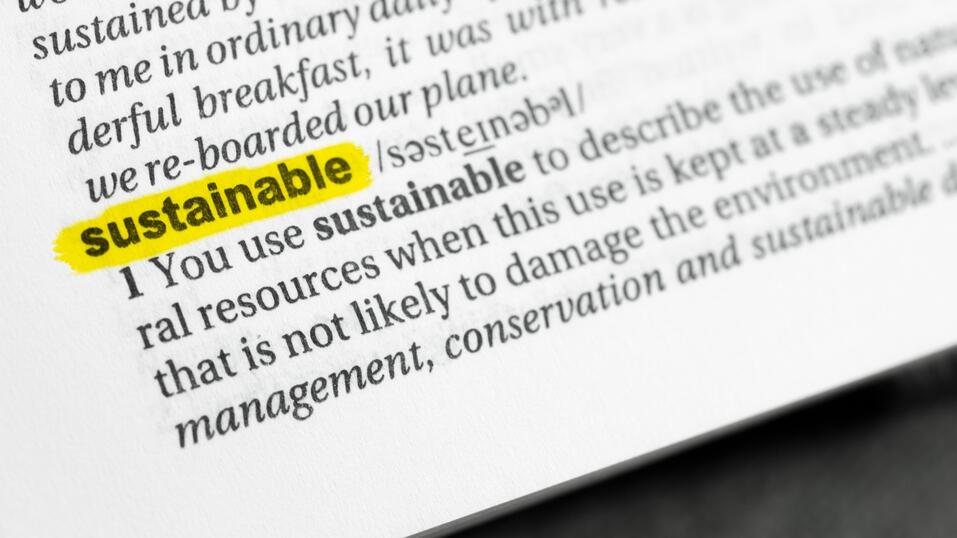„All roads lead to sustainability“
An interview with Yvonne Zwick, Chairwoman of B.A.U.M.
Content
Ms. Zwick, the growing momentum of sustainability issues in business and finance is impossible to overlook. What are the driving forces?
There are economic drivers – rising commodity prices, for example – but there is also great pressure being applied by society as a whole, with movements like Fridays for Future raising awareness around the dinner table. An inter-generational dialogue has begun and young people are leaving their elders in no doubt about what needs to be done and why the need for action is so urgent.
So, it is the younger generation setting the pace?
This is most interesting: society is operating like a seismograph, tracing the issues companies cannot avoid addressing in the near future – and would thus be well-advised to tackle straight away.
Because there are risks involved if they fail to respond?
Precisely. We talk about there being a social licence to operate: the more willing a company is to accept reputation risks, the more volatile its business model becomes. That said, I believe we need to change the way we think about the concept of risk in the context of sustainability.
Why?
There are auditing firms that insist every statement a company makes about things that lie in the future represents a risk per se. Nobody can foretell whether or not a particular quantifiable target will be achieved of course. Companies consequently prefer to report on what they have already done in the sustainability arena.
Today, though, that just is not enough. We need to see companies formulating ambitious targets – and as part of that process all of us, the financial market and its investors included, ought to contemplate how tolerant we are prepared to be when targets are missed. My view is that we need a system in which I am allowed to explain why I did not manage to reach this or that sustainability target. Ideally, a more tolerant approach of this nature would motivate the considerable number of companies still holding out on sustainability to set the wheels in motion at last.
„We need a system in which I am allowed to explain why I did not manage to reach this or that sustainability target. Ideally, a more tolerant approach of this nature would motivate the considerable number of companies still holding out on sustainability to set the wheels in motion.."
Yvonne Zwick,
Vorsitzende des Netzwerks B.A.U.M

Yvonne Zwick
Yvonne Zwick became chairwoman of the B.A.U.M. network at the beginning of 2021 after 16 years in various roles at the German Council for Sustainable Development. She is a member of the German Futurewoman initiative, which aims to empower women in sustainability and help them advance in their career.
And what if these companies decline to be motivated?
So long as the financial market cares about sustainability, any company that tries to ignore the subject will find itself in real difficulty sooner or later. It will be impossible for business customers to say "Not our problem" if banks have clear decarbonisation strategies to follow for their portfolios and lending activities and are conducting climate scenario analyses and stress tests. The lights are green and all roads lead to sustainability – for the financial sector and hence, in its wake, for the real economy as well.
So, the financial sector is at the controls?
Yes, because the financial sector wants good profits. Robust profits. Looking at daily profit indicators creates an illusion of objectivity that fails to recognise risk. I am therefore pleading for the costs of the overexploitation and wasteful use of natural resources, of social injustice and of CO2 emissions to be identified more transparently.
Why not include these negative effects in the economic record in the interests of controlling and accounting for sustainability matters? That would enable us to assess a company's environmental and social impact as well as its commercial success and to determine the value of its business model now and in the future. And the future value of a company's business model is exactly what the financial sector would like to know too.
Info on B.A.U.M.
The Bundesdeutscher Arbeitskreis für Umweltbewusstes Management (B.A.U.M.) e. V. (Federal German Working Group for Environmentally Conscious Management) has been linking economic, ecological and social issues since 1984. Today, with around 550 members, it is a strong corporate network for sustainable management.
More on Sustainable Finance
- Sustainability at a glance
Sustainability at a glance
- Business is booming – and paying its way
Business is booming – and paying its way
- Sustainable finance and COVID-19: brake or boost?
Sustainable finance and COVID-19: brake or boost?
- Avoiding greenwashing: substance not soundbites
Avoiding greenwashing: substance not soundbites

What is sustainable finance?
Key terms associated with the issues of sustainability and green finance - explained in a clear and straightforward way.

